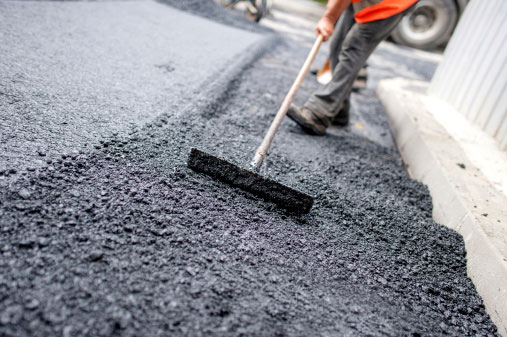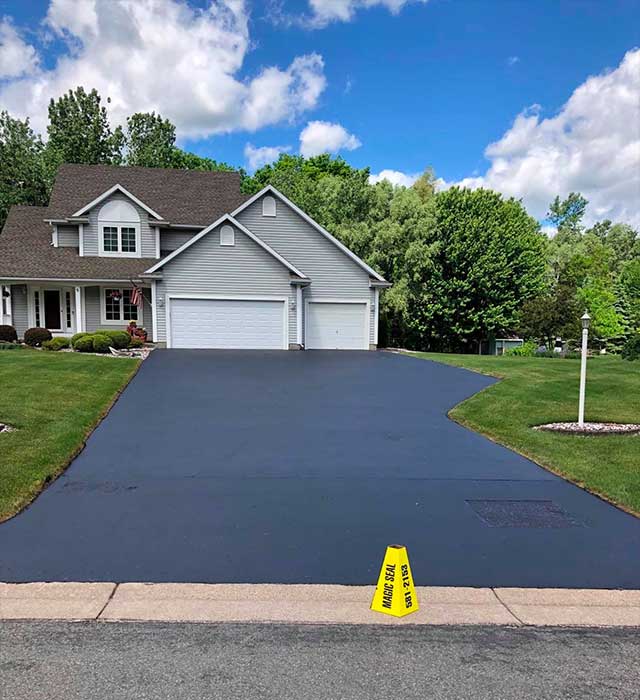Understanding Tilted Parking: How Asphalt Sealing Boosts Commercial Lots
Understanding Tilted Parking: How Asphalt Sealing Boosts Commercial Lots
Blog Article
Hot Mix Asphalt: A Lasting Option for Sidewalk
Warm Mix Asphalt (HMA) has actually arised as a leading lasting option for sidewalk remedies, offering a myriad of cutting-edge technologies and environmental benefits. As the demand for environmentally friendly construction practices expands, discovering the subtleties of HMA's sustainability can offer valuable insights into the future of sidewalk services.
Environmental Advantages of Warm Mix Asphalt

In Addition, Warm Mix Asphalt helps to mitigate city warm island effects. Its dark color takes in sunlight, reducing the quantity of heat reflected back into the ambience contrasted to lighter-colored pavements. This can reduce ambient temperatures in city locations, decreasing the need for cooling and ultimately lowering energy intake.
Furthermore, Warm Mix Asphalt adds to boosted stormwater administration. Its permeable nature enables water to penetrate the pavement and reenergize groundwater materials, lowering drainage and the danger of flooding. These environmental benefits make Warm Mix Asphalt a sustainable choice for paving freeways and roadways.
Power Effectiveness in HMA Manufacturing
Is energy efficiency an essential consider the manufacturing of Warm Mix Asphalt (HMA)? Definitely. Power plays a significant function in the manufacturing of HMA, impacting both cost and environmental sustainability. One crucial facet of energy effectiveness in HMA production is the use of warm mix asphalt (WMA) modern technologies (commercial parking lot paving). WMA permits the mixing and placement of asphalt at reduced temperatures compared to traditional hot mix asphalt, resulting in decreased power usage throughout production. This procedure not just reduces fuel use but likewise reduces greenhouse gas emissions, making it a much more ecologically pleasant alternative.
Moreover, innovations in plant modern technologies have actually led to more energy-efficient HMA production processes. By optimizing power usage in HMA production, the sector can lower its carbon footprint while keeping top notch sidewalk products.
Recyclability of Warm Mix Asphalt
The recyclability of Warm Mix Asphalt (HMA) is a crucial aspect of its sustainability and long-lasting ecological effect. HMA is just one of the most recycled materials in the United States, with over 100 million heaps of recovered asphalt pavement (RAP) being recycled annually in brand-new sidewalk building and construction. Reusing HMA supplies numerous environmental benefits, such as reducing the demand for virgin products, lowering energy intake throughout production, and decreasing the quantity of waste sent out to garbage dumps.
The process of reusing HMA entails crushing the existing pavement, squashing it right into smaller sized pieces, and mixing it with brand-new accumulation and asphalt binder to develop a recycled mix. This recycled mix can typically carry out in addition to or even better than conventional HMA, while requiring fewer basic materials and producing reduced greenhouse gas exhausts. By incorporating RAP into new pavement projects, road companies can save all-natural sources, reduce prices, and minimize the ecological impact of road building and construction and upkeep tasks. Generally, the recyclability of HMA plays a significant duty in advertising sustainable practices within the sidewalk sector.

Long-Term Performance of HMA
Asphalt pavements show toughness and resilience over an extended duration, showing the long-term performance of Hot Mix Asphalt (HMA) The durability of HMA can be connected to its capacity to hold up against rush hour loads, extreme climate condition, and the results of aging. Studies have actually shown that well-designed and properly built HMA sidewalks can last for 20 years or even more with normal maintenance. The secret to taking full advantage of the long-lasting efficiency of HMA depends on making use of high-quality products, adhering to finest practices in building, and carrying out reliable maintenance methods. Proper water drainage, regular evaluations, and timely repairs are necessary check here for protecting the structural stability of HMA pavements in time. In addition, advancements in HMA technology, such as the use of polymer-modified binders and warm mix asphalt, have actually better enhanced the toughness and durability of HMA sidewalks. By focusing on top quality construction and maintenance techniques, HMA remains to verify itself as a lasting and economical service for lasting sidewalk framework.

HMA: Longevity and Sustainability
Demonstrating both resilience and sustainability, Hot Mix Asphalt (HMA) has become a cornerstone in the building of resilient sidewalk facilities - regrading. HMA's durability originates from its capability to withstand heavy lots, harsh climate condition, and high website traffic quantities, making it a reliable selection for roads, freeways, and click for source flight terminal paths. The make-up of HMA, which usually consists of accumulations, binder, and filler, plays a crucial duty in improving its longevity and resistance to put on and tear
Moreover, HMA's sustainability exists in its recyclability and energy-efficient production process. The capacity to reuse redeemed asphalt sidewalk (RAP) in brand-new HMA blends decreases the need for virgin materials and lessens the environmental effect of pavement building and construction and maintenance. In addition, the energy effectiveness of creating HMA depends on its reduced mixing temperature levels contrasted to various other sidewalk materials, bring about reduced power usage and greenhouse gas discharges.
Conclusion
Finally, hot mix asphalt (HMA) supplies a sustainable service for pavement with its environmentally friendly characteristics. HMA's recyclability, power effectiveness in production, and lasting longevity make it an environment-friendly option for roadway construction. By saving natural deposits, reducing waste, and reducing greenhouse gas discharges, HMA plays an essential function in promoting sustainability in infrastructure development. Its ability to alleviate urban heat island results additionally underscores its value in creating resilient and environmentally aware pavement systems.
HMA is click resources one of the most recycled products in the United States, with over 100 million lots of redeemed asphalt pavement (RAP) being recycled each year in new pavement building.The procedure of reusing HMA includes milling the existing sidewalk, crushing it into smaller sized items, and blending it with new aggregate and asphalt binder to produce a recycled mix.Asphalt sidewalks show resilience and strength over an extended period, mirroring the long-lasting performance of Warm Mix Asphalt (HMA) Additionally, improvements in HMA modern technology, such as the use of polymer-modified binders and warm mix asphalt, have further boosted the resilience and longevity of HMA pavements. The capability to reuse recovered asphalt sidewalk (RAP) in brand-new HMA blends decreases the need for virgin materials and minimizes the environmental effect of pavement building and construction and maintenance.
Report this page